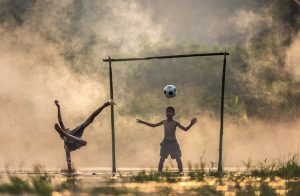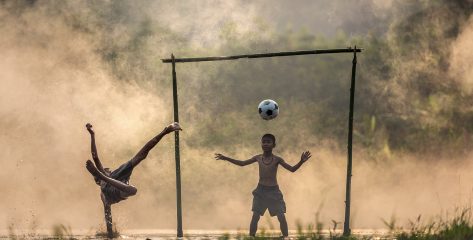By
Maria Constanza Campos Correa
Football superstars like the Uruguayan Luis Suárez, the Portuguese Cristiano Ronaldo have been on display in Qatar for the FIFA World Cup 2022. The Senegalese striker Sadio Mané would also have been present had he not been injured. What popular narrative about such football stars is often about goals, career, money, and media attention. What is often not talked about so much is their story of migration, which inspired them to leave their families, towns, and cultures, and where their path to sporting success really began. There are many other athletes who have tried and failed along the way.
The Café 89 Podcast gives voice to these stories. The podcast created by the Mission 89 in association with the SiNAFE Project, aims to raise awareness of the issue of athlete migration by exploring the challenges, barriers and possibilities faced by immigrants who desire to pursue an elite football career.
To be more specific, The SiNAFE Project is an EU Erasmus+ Collaborative Partnership Project that was developed with the intention of fostering social inclusion and equal opportunities in sport for all people.
 Here the focus is on African athletes for the podcast’s initial episodes and interviews. I became interested in these conversations because of two things. The first, and the one that is most directly related to what the Sinafe project is doing, is that in more difficult situations, such as the case of many African children who aspire to play football, the assistance of an outsider with more knowledge who can counsel, and direct young people is essential for their migration journeys.
Here the focus is on African athletes for the podcast’s initial episodes and interviews. I became interested in these conversations because of two things. The first, and the one that is most directly related to what the Sinafe project is doing, is that in more difficult situations, such as the case of many African children who aspire to play football, the assistance of an outsider with more knowledge who can counsel, and direct young people is essential for their migration journeys.
Ode Fulutudilu, a professional football player, talks in the second chapter of the podcast about the fact that: “It is extremely important to have, not just any person, but to have the right person who has the capabilities of helping you through, because it’s a long process, is not an easy process.”
Another case does the exact opposite. Alassanne Diakité, a young African football player who was misled into going to play in Europe, suggests that one way to prevent youth from being misled into going to Europe is to: “Make them see the odds for and against, tell the truth, and explain things as they are.”
He goes on to say that it was not easy and that in his case because he was told:
“Everything is going to be easy once you get to Europe with your courage, spirit, and talent,” but when he got there, he learned that coming to Europe is the beginning of a new adventure and that there are many talented people there.
When I asked, “When you were in Africa and dreamed of playing in Europe, what did you want to buy with your first salary as a professional player?”, the interviewees typically replied, “help my family” or “buy a house for my mom.”
The South American children who were interviewed for the book “Niños Futbolistas,” which was written by Juan Pablo Meneses, also gave similar answers to this question.
Behind the stories of Alassane, Ode, Mané, Suárez, Ronaldo, and countless others, there are also tales of need, the pursuit of opportunities, and the stories of families who see in these kids a chance to escape poverty.
The first episode: Alassane Diakité’s testimony was featured in the podcast’s first episode. Diakité, a football player from Mali, is one of many children and teenagers who were convinced to travel to Europe to play football before discovering that the situation was entirely different.
Listen to Alassane´s episode here (Spanish with English subtitles)
The second episode: Ode, a current member of FC Fleury 91 in Fleury-Merogis, France, provides a description of her journey from her birthplace of the Democratic Republic of the Congo to France. She stressed the significance of setting up a support system when pursuing a career in sports.
Listen to Ode´s episode here (English).




amazing, The photo is taken from Indonesiam.